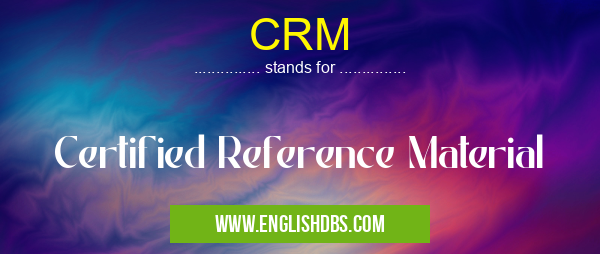What does CRM mean in CERTIFICATIONS & DIPLOMAS
CRM (Certified Reference Material) is a substance or material of known and certified composition that is used to calibrate or validate measurement equipment, or to assess the accuracy of analytical methods.

CRM meaning in Certifications & Diplomas in Business
CRM mostly used in an acronym Certifications & Diplomas in Category Business that means Certified Reference Material
Shorthand: CRM,
Full Form: Certified Reference Material
For more information of "Certified Reference Material", see the section below.
What is CRM?
CRMs are typically used in analytical chemistry and environmental monitoring, where they provide a known reference point against which measurements can be compared. They are also used in forensic science, materials science, and other fields where accurate measurements are critical.
Importance of CRM
CRMs play a vital role in ensuring the accuracy and reliability of analytical measurements. By providing a known reference point, CRMs help to:
- Calibrate measurement equipment
- Validate analytical methods
- Assess the uncertainty of measurements
- Identify and correct measurement errors
Types of CRM
There are various types of CRMs available, each designed for a specific purpose. Some common types include:
- Primary CRMs: These are materials with the highest level of accuracy and traceability. They are typically used for calibrating measurement equipment.
- Secondary CRMs: These are materials with a lower level of accuracy than primary CRMs. They are typically used for validating analytical methods and assessing the uncertainty of measurements.
- Reference materials: These are materials that are not certified but have been characterized for specific properties. They are typically used for research and development purposes.
Essential Questions and Answers on Certified Reference Material in "BUSINESS»CERTIFICATES"
What is a Certified Reference Material (CRM)?
A CRM is a material or substance with one or more properties that have been accurately characterized and certified by a recognized organization. CRMs are used to calibrate and verify analytical instruments, to ensure the accuracy and reliability of measurements.
Why are CRMs used?
CRMs are used to ensure the accuracy and reliability of analytical measurements by providing a known reference point. They are used in various industries, including environmental monitoring, food safety, and pharmaceutical manufacturing.
What are the different types of CRMs?
There are many different types of CRMs, each designed for a specific purpose. Some common types include:
- Chemical reference materials: These CRMs contain known amounts of specific chemicals, and are used to calibrate analytical instruments.
- Physical reference materials: These CRMs have specific physical properties, such as density or viscosity, and are used to calibrate and verify instruments used to measure those properties.
- Biological reference materials: These CRMs contain known amounts of biological materials, such as DNA or proteins, and are used to calibrate and verify instruments used in biological assays.
How are CRMs produced and certified?
CRMs are produced and certified through a rigorous process that involves:
- Characterization: The material is carefully characterized to determine its properties.
- Homogeneity testing: The material is tested to ensure that it is homogeneous throughout.
- Stability testing: The material is tested to ensure that it is stable over time.
- Certification: A recognized organization, such as the National Institute of Standards and Technology (NIST), certifies the material's properties.
How can I obtain a CRM?
CRMs can be obtained from a variety of sources, including:
- National metrology institutes: These organizations provide CRMs for a wide range of applications.
- Commercial suppliers: Many companies offer CRMs for specific industries and applications.
- Research institutions: Some research institutions may have CRMs available for specific research purposes.
Final Words: CRMs are essential tools for ensuring the accuracy and reliability of analytical measurements. They provide a known reference point against which measurements can be compared, helping to calibrate equipment, validate methods, and assess uncertainty. By using CRMs, laboratories can ensure that their measurements are accurate and reliable, which is critical for making informed decisions and protecting the environment.
CRM also stands for: |
|
| All stands for CRM |
